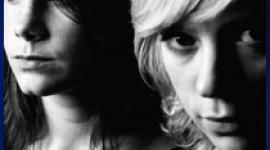Life Events and Bipolar Disorder (Preliminary Findings)
Life events appear to have an important role in the recovery from bipolar disorder as well as bipolar relapse.
 After several years of conducting clinical and research work on unipolar depression, I sought an internship at Brown University to gain further exposure to inpatient mood disorders. During my first interview at the new internship, the client threatened me and angrily left the room. Within 3 days, the same client spent several hours gently explaining his life and problems with bipolar disorder to me in a softspoken, incredibly well mannered way. The image of this patient's dramatic and quick changes stayed with me, and was compounded by watching other patients experience equally rapid shifts in their moods.
After several years of conducting clinical and research work on unipolar depression, I sought an internship at Brown University to gain further exposure to inpatient mood disorders. During my first interview at the new internship, the client threatened me and angrily left the room. Within 3 days, the same client spent several hours gently explaining his life and problems with bipolar disorder to me in a softspoken, incredibly well mannered way. The image of this patient's dramatic and quick changes stayed with me, and was compounded by watching other patients experience equally rapid shifts in their moods.
Over the next several years, this image became juxtaposed against unanswered questions of what contributed to the timing of these shifts. I became fascinated by questions about whether changes in the psychosocial environment, particularly life stressors, might influence the timing of recovery and relapse within bipolar disorder. Although there are certainly strong biological contributions to the course of bipolar disorder, other diseases, such as diabetes and cancer, had shown strong relationships with stress.
In 1993, I received a small grant from the National Alliance for Research on Schizophrenia and Depression (NARSAD) to examine the impact of life events on the timing of recovery and relapse within bipolar disorder. Two hypotheses were primary. First, individuals who experienced severe stressors during their episode were expected to demonstrate slower recovery than individuals without severe stressors. Second, individuals who experienced severe stressors following an episode were expected to relapse more quickly than individuals who did not experience severe stressors.
Preliminary research had examined the relationship between stress and bipolar relapse, but several important confounds would need to be addressed to understand these relations better.
I became fascinated by questions about whether changes in the psychosocial environment, particularly life stressors, might influence the timing of recovery and relapse within bipolar disorder.
First, much of the previous research had asked people to evaluate their own stress. Unfortunately, depressed individuals tend to perceive their stressors more negatively (even if the actual events are comparable), making it difficult to use self ratings of stress within this area. Beyond problems in accurately capturing stress levels, symptoms of mania and depression might in fact contribute to stressful environments. For example, depressed people might develop difficulties at work due to decreased concentration or difficulties in interpersonal relationships due to social withdrawal and lack of ability to enjoy pleasurable activities. Similarly, manic episodes might lead to stress due to overspending, impulsive behavior, and irritability. To control for these factors would require attention to whether stressors occurred independently of disorder.
To begin to tease apart stress more carefully, I relied on an interview based method of assessing life events developed by George Brown and Tirril Harris, the "Life Events and Difficulties Schedule" (LEDS). To assess life events, I would interview each subject carefully regarding a full range of possible stressors in their environment. I reviewed all stressors with raters who were blind to diagnostic status, who would evaluate the extent to which the stressor would be severe for the average person, and the extent to which the stressor might have been created by symptoms of depression or mania. Events which appeared to be a consequence of a symptomatology were excluded from all analyses. All subjects were initially approached during an inpatient hospitalization for bipolar disorder and were interviewed extensively to verify their diagnosis. After hospital discharge, my research assistant and I contacted subjects once a month by telephone to complete standardized interviews of depression and mania symptoms. Then, at two, six, and twelve months after discharge, I interviewed subjects regarding life events. To date, 57 subjects have, completed the study, with ongoing data collection in progress. The data from this small number of subjects provides some speculative findings.
Life Events and Recovery
Recovery was defined using previously established criteria of minimal or absent symptoms during symptom interviews and no hospitalizations for two consecutive months. Individuals were categorized for the presence (n = 15) or absence (n = 42) of severe events within the first two months of the episode. Examples of severe events included a sister's diagnosis with cancer, a series of breakins during the night for a single woman, and financial disasters which were beyond the influence of the subjects.
To examine the data, I conducted a survival analysis. This procedure allowed me to compare the median number of months from symptom onset to recovery for subjects with and without a severe stressor.
Results revealed that subjects who experienced a stressor during the episode had a median episode duration of 365 days, while subjects who did not experience a stressor had a median episode duration of 103 days. In other words, subjects with a stressor took more than three times as long to recover as subjects without a stressor. While only 60% of the subjects with a severe stressor had achieved recovery within the follow up period, 74% of the subjects without a severe stressor had achieved recovery.
Life Events and Bipolar Relapse
Data was available to examine relapse in 33 subjects who achieved full recovery within the follow up period. Relapse was defined by high scores on symptom severity measures or the need to be re hospitalized for mood symptoms. For each of the 33 subjects, the presence or absence of a severe event after recovery and prior to relapse was determined.
The primary analysis was a survival analysis, to contrast subjects with and without a severe event on the median number of months from recovery to relapse. The median survival time for subjects who did not experience an event was 366 days. For subjects who experienced an event, the median survival time was 214 days. This would suggest that subjects with a stressor were able to stay well for two thirds as long as subjects without a severe stressor.
Discussion
Life events appear to have an important role in the recovery from bipolar disorder. Individuals who experienced a major stressor after onset were likely to take longer to achieve a full recovery than individuals without a major stressor. Life events also appear to have an important impact on the timing of relapse. Life events were associated with a higher risk for relapse, and relapse occurred more quickly among subjects who experienced a severe life event. These results indicate the need for more careful attention to the role of life events within bipolar disorder.
Several possible explanations can be given for an effect of life events on course. One model would suggest that life events directly influence physiological aspects of bipolar disorder.
Life events appear to have an important role in the recovery from bipolar disorder.
Alternatively, life events may change motivation for treatment or compliance with medications, which would then influence symptoms. In other words, individuals experiencing significant stress may experience disruptions in seeing their doctor and taking their medications, which would then be reflected in higher levels of symptoms.
To examine this hypothesis, we compared subjects with and without severe stress on follow up treatment and medication compliance. Life events did not appear to influence treatment involvement, suggesting that the impact of life events on course of disorder was not mediated by pharmacotherapy changes.
Despite the promise of these results, they are very limited and should be interpreted with extreme caution. These findings are based on a very small number of subjects. It is highly possible that the sample studied is not representative of the broader group of individuals with bipolar disorder; individuals who believed stress was linked to their episodes may have been more willing to sign up for the study. It remains questionable whether these findings could be replicated with a larger number of subjects. Although this magnitude of finding would be important if replicated, the small number of subjects makes it impossible to determine if this is a reliable difference.
If these results generalize to a larger group of subjects, then much work is necessary to understand the relationship between stress and the course of bipolar disorder. Little is known regarding factors which link the life events with episodes. For example, some individuals would argue that life events may disrupt schedules and sleep, so that sleep is more casually linked with symptoms. Knowing more about the mechanisms linking stress and symptoms might help identify certain kinds of stressors which are most risky for individuals with bipolar disorder.
In addition to understanding the mechanism linking stress and disorder, there is a fundamental need to understand whether there are certain individuals with bipolar disorder who are more vulnerable than others to illness following stress. The extent to which social support buffers the impact of events remains unknown for bipolar disorder. Similarly, knowing how effectively medication buffets the effects of stress is of prime importance. More research is necessary on these possibilities to help guide clinical interventions.
To begin to examine these questions, I have applied for a larger grant from the National Institute of Mental Health to examine life events and bipolar disorder. If provided, funding would allow for examination of many of these questions. Most importantly, funding would allow me to examine whether these preliminary findings can be replicated if tested with a larger group of individuals.
(This article was first published in 1995)
About the author: SHERI JOHNSON, Ph.D. is am assistant clinical professor at Brown University and a staff psychologist at Butler Hospital in Providence, Rhode Island.
next: The Manic Panic Connection
~ bipolar disorder library
~ all bipolar disorder articles
APA Reference
Staff, H.
(2008, November 10). Life Events and Bipolar Disorder (Preliminary Findings), HealthyPlace. Retrieved
on 2026, January 10 from https://www.healthyplace.com/bipolar-disorder/articles/life-events-and-bipolar-disorder



